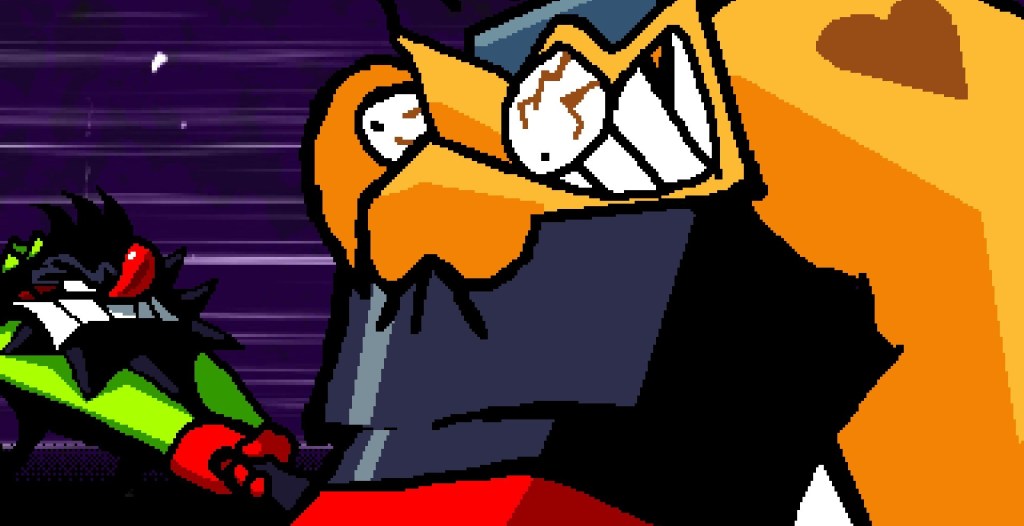Tusks: The Orc Dating Sim is a game that invites players to wander the Scottish Highlands as part of an ensemble of gay male orcs. Aside from being a mashup of words that aren’t usually seen together, the game explores diversity in a way that feels more natural than overly conscious. One orc suffers from a mental illness. Another is missing a limb. There is “a polyamorous trio of orc chieftains.”
Tusks isn’t out yet, but it sounds fascinating, so to learn more we talked to the game’s mastermind, 26-year-old Mitch Alexander, a gay Glaswegian freelance writer and game design graduate.
Videos by VICE
VICE: First question: Why orcs?
Mitch Alexander: One of the reasons I wanted to explore orcs is because they’re almost always the outsiders. The language used to describe them, their physiology, their culture, their relationships is constructed to emphasize how inhuman, how other they are. But a lot of those traits are most strongly connected with members of marginalized groups.
How so?
Race is the most obvious one. Fantasy tends to be built around some kind of racial categorization system: human, elf, orc, dwarf. Often you’ll find orcs are unthinkingly given traits that are harrowingly similar to real-world ideas rooted in racism. You’ll also find ableism, misogyny, homophobia, cissexism, and classism presented in one big bundle that’s justified because orcs are “inherently evil.” It’s an uncomfortable connotation for the folk that share similar traits.
To be honest, I never really considered orcs so much, but I suppose that’s true.
It’s extremely loaded and can’t just be dismissed by saying, “It’s just fantasy, it’s meaningless.” For a lot of people, it’s easier to identify with the monster of a story than the hero we’re supposed to root for. The hero often brings with them a kind of entitlement due to their ability, their independence, their legal/moral/religious prerogative, their race, their class. That tends to cause trouble rather than reduce or solve it.
Is Tusks personal in that sense?
A lot of the scenarios in the game do touch on the personal and the political. You find out, for example, that one of the orcs has problems with mental illness which caused him to believe he was inherently, unfixably weak, and how he deals with that. That’s both me wanting to show mental illness isn’t a hyperbolic and grim, but something that happens to people we should be able to talk about. Also it touches on my own experiences with mental illness too so maybe I’m a little less afraid of talking to people about it as well.
Can we talk about your mental illness?
I have depression and social anxiety—which, as mental illnesses go, are fairly common. I have a fairly good handle on both in my day-to-day life, which I’m very thankful for, because it means I can make games like Tusks without just giving up out of a sense of fatalism. It also means I can do interviews like this one without freaking out that I’ve said something stupid. Brains are weird, weird things.
So how has your background informed Tusks?
The most obvious is the setting: I live in Scotland, and Tusks takes place in a semi-mythical version of the country. I also wanted Tusks to be a game that people could play and see recognizable elements. Most of the characters in Tusks are fat is because I’m fat as well. It’s hard to see positive images of fat people in any medium, let alone queer games.
A lot of the characters have scars, physical and mental disabilities, markings, body hair, and stretch marks. Again, those are things that inform the life of a lot of gay men like me in very specific ways, but rarely get represented positively. There are even small personal elements, the orcs of Tusks travel the country and assemble with others like them every so often. That’s reflective of my own family’s history as fairground travelers.
The character I find fascinating is the orc with one arm.
Ah, that’s Ferdag. We so rarely see characters in games with disabilities—even in the ones that are all about war, violence, shooting, maiming, stabbing, and slashing. That’s partially due to perceived issues with modeling characters. But it’s also due to well-meaning but self-defeating worry about not representing disabled people perfectly, of the feeling that disabled bodies are taboo, dangerous, and non-sexual. Ferdag is your typical mercenary warrior whose arm had to be amputated due to severe injury, and who has had to find new ways to adapt to the warrior life.
Are LGBTIQ games a growing market?
They definitely are a growing market. There’s a surge of interest in exploring games by, for and about members of marginalized groups of all kinds, including those who’re members of marginalized gender and sexual orientations.
It’s interesting also that the focus isn’t primarily on sex.
There are probably more games that aren’t specifically about sex. But it’s important to recognise that sex is still an important thing a lot of LGBTIQ individuals want to explore.
What do you feel Tusks is providing that other games in this space aren’t?
Tusks provides a story and a mythology that’s usually centered around straight folk but in this case is unequivocally gay. And without any caveat attached to it like, “It’s gay if you kinda read it this way,” or “It’s gay, but it’s a tragic love story that ends horribly,” or “One of these characters is gay and it’s not like, A Thing, and also you never see them kiss anyone so it’s not all in your face about it.” I hope it doesn’t remain unique in that respect for very long, though, if it ever was in the first place.
Tusks will be available in “a few months, barring any intrusion of real-life horrors and distractions!”
Follow Toby on Twitter.
All images via
More
From VICE
-

Screenshots: Sega, Nintendo, Square Enix -

Screenshot: Shaun Cichacki -

Screenshot: Archetype Entertainment -

Screenshot: Resolution Games